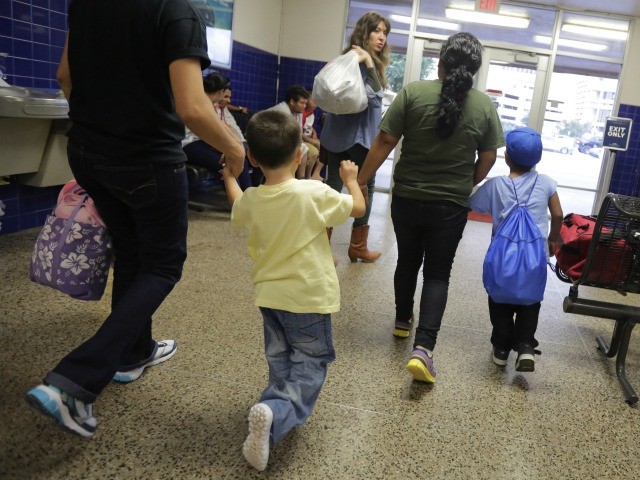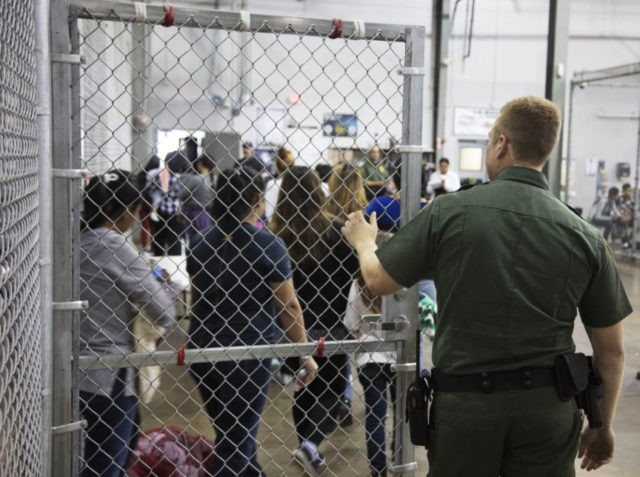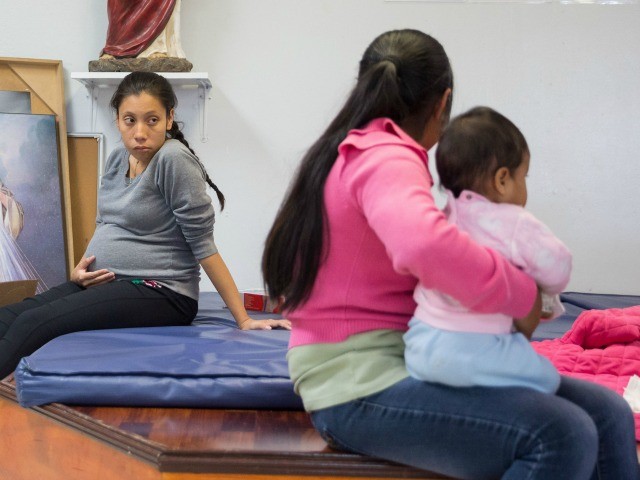A report in a left-wing Texas newspaper shows how progressives’ migration promises are splitting Central American families, enriching cartel-linked smugglers and impoverishing migrants.
The poignant report about one migrant’s journey also shows, quietly, that President Donald Trump’s policies are deterring high-risk migration, and that progressive American lawyers are trying to profit from migrants’ hopes.
The article by the non-profit Texas Tribune was written in cooperation with a reporter at Nómada, a Guatemalan news organization founded in 2014. It focuses on one unlucky, hard-working, indigenous Guatemalan migrant who hoped to get a U.S. job by using the progressives’ immigration loopholes to squeeze into the United States.
David Xol is a Guatemalan Indian who works to support his three children and his wife, Florinda. According to the article, he lives in:
the remote highland state of Alta Verapaz, Guatemala, the poorest area in the country, where he works on a plantation cutting African palm from 5 a.m. to 4 p.m. six days a week … “I don’t have a good job, so that was the intention — going to the U.S. to work, to give a better life to my sons in the future.”
When he split from his wife and children in May 2018, “Xol planned to work in the United States for a few years, then return to San Miguel with enough money to pay off a loan.”
That plan was rational. It has worked for millions of prior migrants, most of whom walked through weak border barriers to get jobs from cheating employees in the United States. Both political parties in Congress, plus business lobbies and progressive activists, as well as Presidents George H. Bush, Bill Clinton, George W. Bush and Barack Obama, all of whom aided this migration by turning a blind eye to the impact of migration in the United States, Mexico, and Central America.
As normal, Xol needed a smuggler to get past the criminals and police in Mexico. He borrowed money from a friend and took out a third mortgage on his house. In exchange for the cash, the smuggler also provided the Guatemalan peasant with some legal advice about the 2015 Flores loophole.
The loophole was created in 2015 by the ACLU, Judge Dolly Gee, and officials in the Obama administration when they agreed in the Flores Settlement that migrants who bring children must be released into the United States after 20 days. But how can migrants stretch their pre-deportation detention time beyond the 20 days?
Obama’s deputies had already provided the answer by allowing migrants to file for asylum court hearings by making a merely “credible” fear of gangs or spousal abuse. That low-bar asylum claim takes at least 45 days to process, pushing migrants’ likely detention 25 days beyond the Flores deadline. This combination allowed 370,000 migrants and children to be released almost as soon as they were caught from 2012 to 2017.
The Tribune reported Xol’s admission:
Xol said he brought [his seven-year-old child] Byron with him on the advice of a local smuggler, who told him that parents with children have an easier time getting into the country than adults traveling solo.

FILE – In this July 7, 2015, file photo, immigrants from El Salvador who entered the country illegally walk through a bus after they were released from a family detention center in San Antonio, Texas. The vast majority of immigrant children who arrive alone at the U.S. border are placed by the government with adults who are in the country illegally, federal data reviewed by The Associated Press show. (AP Photo/Eric Gay, File)
The next part of the loophole is federal asylum law, which says that migrants with pending asylum case must be given work permits.
The next loophole in the non-enforcement of immigration laws in the workplace. Xol and other migrants are not stupid — they know U.S. enforcement has been so weak that they can skip their court hearing and disappear into the huge population of illegal immigrants with minimal fear of deportation if they avoid committing a violent crime.
The smuggler may not have told him about another important loophole — the Supreme Court’s June 1982 Plyler v. Doe, decision — but the Tribune acknowledged that Xol knew his child would get free education, protection, and food while Xol worked in jobs. The Tribune noted that Xol:
also hoped to enroll his son in school in the U.S.
Plyler says that state school officials must provide free education to children illegally brought into the United States by illegal migrants: By denying these children a basic education, we deny them the ability to live within the structure of our civic institutions, and foreclose any realistic possibility that they will contribute in even the smallest way to the progress of our Nation.”
The trip through Mexico was dangerous, but tough Xol and little Byron survived, even though one of other migrants died alongside them:
At one point, Xol heard screams from the other crates; a woman had suffocated. To escape the stench of her corpse, the immigrant who was sitting next to the woman when she died joined Xol and Byron, who squeezed together to make room.
The dead migrant remains nameless and ignored by Judge Dolle Gee and progressive activists.
Despite his determination, Xol was extremely unlucky — he arrived just as Donald Trump and Attorney General Jeff Sessions discarded Obama’s catch-and-release rules:
“I felt hope,” Xol recalled. “But nothing went as it was planned.”
Xol arrived in May so just as Trump’s deputies closed up the Flores loophole by sending the children to housing run by the Department of Health and Human Services so the parents could be held in detention by the Department of Homeland Security until their asylum cases were concluded:
A few days later, at the processing center, Xol was separated from Byron. “Don’t worry, son, it’s all part of the journey,” he said as he was led away in shackles. On May 21, Xol pled guilty to illegal entry in a mass trial at the federal courthouse in McAllen. When he returned to the processing center, immigration officials informed him that under “the new law signed by President Trump,” he wouldn’t see Byron again anytime soon.
Xol’s plan fell apart when he could not use the Flores catch-and-release loophole to get a job in the United States, and by the end of May, he was repatriated back to Guatemala.
Xol was unlucky. If he had arrived two months later, the would have been quickly released via the Flores loophole because Trump quickly ended his housing-and-detention policy amid a self-congratulatory uproar from progressives in the media, the courts, and the Democratic Party.
But there is little point in trying again because Sessions is creating new legal barriers. He is ending Obama’s asylum rules and is developing a new workaround of the Flores settlement.
If Xol tries again, he has no way to make a claim for asylum so he and his son would be sent home before the Flores 20-day deadline. Worse, Xol likely has already been convicted of illegally entering the U.S. and will face tough penalties if he tries again.
But Xol still needs to repay the loan which he used for the smuggler:
Now, he’s scrambling to make payments on $8,000 in debt, handing all his monthly earnings to the bank.
And where is his child?
Byron is still in the United States because of a federal law, specifically the William Wilberforce Trafficking Victims Protection Reauthorization Act of 2008. That law was interpreted by Obama’s deputies to require that all unaccompanied children who cross the border have an independent right to file for asylum. The law’s text says it only applies to children who are trafficked, but Obama’s interpretation says Byron became an “unaccompanied alien child” when his dad was sent home.
So the child remains in the United States:
Nearly three months later, Byron remains in a shelter in Baytown, east of Houston, where about once a week he calls his mother, pleading with her in their native Q’eqchi’ — a Mayan language spoken in the Americas since long before the Spanish conquest — to send him back to his family in Guatemala…
At the moment, Byron, who turned 8 in June, has no hearing date in immigration court, according to two people familiar with the case. Nor does he have family members in the U.S. to monitor his situation or help get him back to Guatemala
The Tribune article is vague about the legal details. Many migrants were reunited with their children in DHS detentions sites, or else signed documents allowing their children to stay in the United States. Nearly all of those signed-away children are delivered by HHS to close relatives of the parents, such as illegal-immigrant siblings. But the article does describe the mother’s horror that Xol did not return with her son:
“Where is the child?” she said in Q’eqchi’ as Xol climbed out of the bus. “My son. Where is he?”
“He stayed there,” Xol told her.
Florinda let out a shriek. “I couldn’t say anything,” Xol recalled. “She started to scream and scream.”
Xol’s disastrous example, however, is helping to persuade his neighbors that it is a bad idea to go into debt to pay smugglers for a fruitless trip north:
Xol said he faces constant questions from nosy villagers about his trip to the border. “They say, ‘You went because you are dumb,’” he said. “That’s the first thing they say. ‘How did you not think?
But this ghastly process of Central American debt, death, and divided families has a big upside for some progressives who use it to earn a living and to shower praise on each other:
The case was at a standstill until late last week, when the celebrity lawyer Michael Avenatti and his Laredo-based associate, civil rights attorney Ricardo De Anda, agreed to represent the family pro bono.
Avenatti and De Anda were alerted to Byron’s case by Sylvia Rodriguez, an immigrant advocate in New Jersey who has worked with the family this summer and raised money to support separated children.
In recent weeks, Avenatti — an outspoken Trump critic better known as the attorney representing porn star Stormy Daniels in her legal battle with the president — has collaborated with De Anda on a number of family separation cases, including the reunion of an immigrant child named Antony with his deported mother in Guatemala City on Aug. 14.
But there’s little chance that the process will be quickly ended by returning Byron back to his family and school and very little chance that the progressives will quietly pay off Xol’s debts.
Instead, the lawyers are considering plans to bring Xol back into the United States so he can continue the public legal fight to win some benefit for his son:
The new legal team has two options for reuniting Xol and Byron: Ask an immigration judge to grant Byron a “voluntary departure” so that he can return to Guatemala; or seek to overturn Xol’s original deportation, paving the way for him to reunite with his son in the U.S. and seek asylum.
De Anda said that after preliminary conversations with Xol, he’s leaning toward the second option.
But that second option needs some evidence, for example, that the father and son need asylum to escape dangerous Guatemalan gangs. And so, according to the Tribune:
When he spoke with his client last week, De Anda said, Xol described his past run-ins with gangs in Guatemala as a potential source of danger for his family.
“The maras have been pressing to recruit him into their criminal activities. He refused to be pressed into this sort of action,” the attorney said, using the Spanish word for gangs. “He’s been beat up before and he’s afraid he’ll be beat up again.”
But the lawyers’ ambition is legally suspect, as the Tribune explains:
[Xol’s district of] Alta Verapaz generally has a “very low gang presence,” according to Pablo Castillo, a spokesman for Guatemala’s national police.
Besides, Xol also told the Tribune that he does not worry about the gangs, effectively ending his chance of getting asylum:
Two years ago, he said, he had a run-in with local gang members, who tied him up and threw him into a river. Despite that harrowing experience, he said he never intended to request asylum in the U.S. or put down permanent roots.
Worse, Xol does not want to be sent north for the reunification, the Tribune notes:
Xol has made clear that he does not want the reunification to take place in the U.S.
“My wife has been giving me advice about taking it slow, and seeing what we can do for him to come,” he said. “We both have been praying to God for our kid to come back soon.”
But the progressive American claims to know best, according to the Tribune:
De Anda acknowledged the possible downsides of attempting to overturn Xol’s deportation order. But, he added, “the safety of the child is paramount.”
“It needs to be clear to me that Byron will not be placed in danger if he’s returned to Guatemala,” he said.
Xol’s disaster has been great for Democratic politicians and progressive reporters, who used the migration crisis to slam Trump and to generate huge quantities of pro-migration programming.
The Texas Tribune downplays the progressives’ self-dealing, but it does recognize the disaster of Xol’s decision:
A trip designed to build a better life for his children has turned into a financial nightmare. With the family struggling to pay bills and his son stranded in Texas, Xol said he has contemplated suicide.
“It’s not that I am not a man,” he said. “But I don’t know how to pull through anymore.”
Back in Guatemala, however, Xol’s neighbors are rallying around him:
Xol and Florinda got a boost on June 24, Byron’s eighth birthday, when three dozen congregants from the local evangelical church gathered at their cottage to eat tamales and pray. “I had never received so many people at my house,” Xol said.
Read the full story at the Texas Tribune.


COMMENTS
Please let us know if you're having issues with commenting.